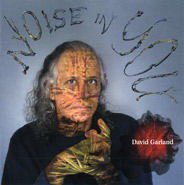
David Garland
Noise In You
(Family Vineyard)
More
than three years after the release of On The Other Side Of The Window –
an album that for this writer was a very pleasant surprise, an album that
I believe still possesses that nice flavour of freshness – Noise In You
is the first work by David Garland to receive a wide distribution. I’m
quite pleased I can say that – after taking into consideration those apparent
instrumental differences that will be discussed in a moment – I believe
that the new work can be placed alongside its high-quality predecessor,
even if its quite different instrumental framework – which will obviously
sound totally natural to newcomers – could require a (brief) process of
adjustment on the part of those who, in time, developed a high degree of
intimacy with On The Other Side Of The Window.
While
reading some news about the soon-to-be-released album on the Web, I was
surprised by the album’s title. The lyrics of the title-track, talking
about the very famous anecdote told by John Cage ("the sonic sage")
about his experience inside the anechoic chamber at Harvard University,
solved this little mystery. But the meaning of Garland’s lyrics goes well
beyond that particular episode, to mean… Well, this is an exploration
that every listener will be happy to do (this time the lyrics are printed
inside the nice CD booklet).
The
sticker placed on the jewel box of the CD announces the "jangle of
a 12-string guitar", and also the presence of Sufjan Stevens on six
tracks: those in a hurry will use those elements to arrive at an easy conclusion,
i.e.,
"new folk". Instead, the stylistic climate of this CD is the same
kind of "user-friendliness" that’s so typical of Garland’s work.
The main point one has to keep in mind is that – in so differently from the
previous album, so rich with piano, keyboards, violin and a lot of studio
work – Noise In You has a lot of 12-string acoustic guitar, and many voices.
But once one has adjusted his/her expectations – and let’s not forget the
fact that the plain, colloquial tone of Garland’s voice makes his melodies
sound
"simple", while at a close listen they are not simple at all –
one will see that the new album is not so different from its predecessor.
After
a brief introduction, prelude 1 – a track that features the nice voice
of Mira Romantschuk, who will appear again, later on the CD – the first
long track is Diorama (I had to look for this word in my dictionary), where
the voices of David Garland and Diane Cluck reminded for a moment – just
a moment, ok? – of those of Paul Kantner and Grace Slick on an album like
Sunfighter (1971). The lyric-sounding Diorama is followed by the "lighter" climates
of My Contraption. Already, at this point, one has noticed the variety
of the instrumentation used by Garland, which features flutes, clarinets,
guitars, basses, percussion, and lotsa more.
Every
Bird and Xs For Eyes (the latter’s action taking place inside some comics)
make good use of the voices of a few guests: Sufjan Stevens on both the
aforementioned tracks, Brendon Massei and Mira Romantschuk on the former
track, which has a classic opening on the piano; we also have a nice performance
from the wind instruments on the latter composition. David Deporis’s vocals
and acoustic guitar give an appropriate contribution to the "modal
folk"
of The Past, which also features Kenji Garland’s electric bass. After the
brief prelude 2, Damn Dreams and Cumulonimbus see Sufjan Stevens back on
vocals; the latter track has a very unusual chorus, where the text is made
entirely of names of different types of clouds…
The
quite dry track 10, titled oh my god, appears to work as a dividing track
of some sort, dividing the album in two parts, more or less of equal duration).
The second part of the work – with tracks such as I Don’t Want To Know,
the instrumental The Intension To Relax And Think About Things, Drop By
Drop (where Greg Saunier’s drums contribute an air of high drama), the
key track Noise In You and the slow This Time – sounds almost like a suite
of some sort. Though it obviously shares many ingredients with the rest
of the work – we also have a female vocalist, Anne Garland, and some interesting
treatments on the acoustic guitar – it’s the second part of the album,
more concentrated and intimate, the one I really liked the most.
Beppe Colli
© Beppe Colli 2007
CloudsandClocks.net | Sept. 27, 2007


